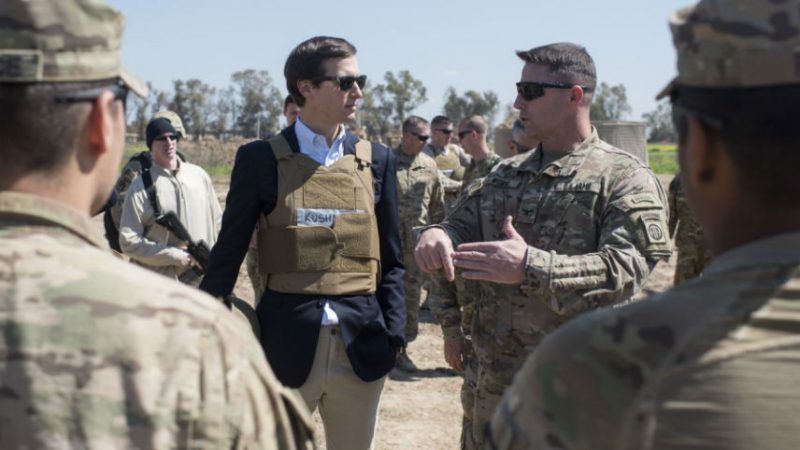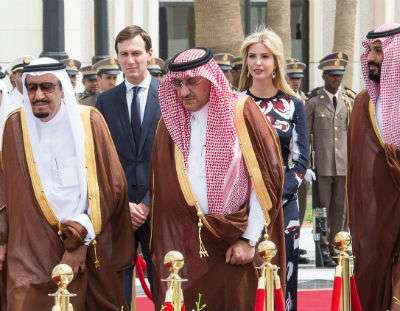Jared Kushner's White House Prominence Was Appalling Long Before This Past Week of Terrible News
Senior policy adviser is a walking conflict of interest playing way out of his depth. But is that reason enough to make his Arab-world dealings subject to the Mueller investigation?


It has been an abysmal week for President Donald Trump's son-in-law and senior policy adviser, Jared Kushner. On Tuesday of last week, it was reported that the White House security-clearance changes imposed by Chief of Staff John Kelly meant that Kushner, who had been operating on a high-level interim clearance, would be downgraded from "top secret" to "secret," meaning he could no longer legally receive highly classified government information such as the president's daily brief. Such a reading-material demotion, many analysts have reasonably contended, would make it damnably hard for Kushner to manage his foreign policy portfolio of negotiating Mideast peace, and serving as presidential intermediary to the two main targets of Trump's campaign rhetoric: China and Mexico.
That same day the Washington Post also published an embarrassing if vague article asserting that "officials in at least four countries have privately discussed ways they can manipulate Jared Kushner." The not-insignificant states in question: Israel, China, Mexico, and the United Arab Emirates. While the piece contained no evidence of subsequent manipulation, nor any historical comparison to similar conversations about previous White House policymakers, it did include the damning nugget that Kushner had conducted several meetings with foreign officials without ever consulting or reporting back to the National Security Council. Also, anonymous quotes like these didn't help:
Within the White House, Kushner's lack of government experience and his business debt were seen from the beginning of his tenure as potential points of leverage that foreign governments could use to influence him, the current and former officials said. […]
Officials in the White House were concerned that Kushner was "naive and being tricked" in conversations with foreign officials, some of whom said they wanted to deal only with Kushner directly and not more experienced personnel, said one former White House official. […]
White House officials said National Security Advisor H.R.] McMaster was taken aback by some of Kushner's foreign contacts.
"When he learned about it, it surprised him," one official said. "He thought that was weird….It was an unusual thing. I don't know that any White House has done it this way before."
Of course, McMaster now has his own problems….
Thursday brought a third body blow to Kushner's tender ribs. The New York Times reported that the embattled adviser held previously undisclosed meetings last year with representatives of both Citigroup and Apollo Global Management, financial institutions that subsequent to those conversations gave to Kushner Companies an eye-opening $509 million in financing. Both Kushner (who has divested incompletely from the business, though his family still owns and runs it) and the bankers say that their meetings contained zero discussion of the deals, though as the Times dryly noted, "There is little precedent for a top White House official meeting with executives of companies as they contemplate sizable loans to his business, say government ethics experts." Ya think?
Then on Friday came this news:
Special counsel Robert Mueller's team has asked witnesses about Kushner's efforts to secure financing for his family's real estate properties, focusing specifically on his discussions during the transition with individuals from Qatar and Turkey, as well as Russia, China and the United Arab Emirates, according to witnesses who have been interviewed as part of the investigation into possible collusion between Russia and the Trump campaign to sway the 2016 election.
As Andrew Prokop muses over at Vox, "The big mystery…is whether Mueller is focusing on all these other topics mainly out of a desire to strengthen a Russia-related case—or whether potential corruption related to Gulf countries and other foreign players is now a new focus in his investigation in and of itself."
One hopes it is the latter, not the former, since the Mueller inquiry is supposed to be about Russia and various possible hijinks related to the 2016 election, not how an underqualified and inexperienced nepotee has blundered through international dealings with unrelated countries in 2017. The investigation should not be used as an expanded security clearance of sorts, or fodder for the seemingly nonstop bureaucratic backstabbing and palace intrigue in Trump's White House. I hope there's a Russian tie-in.
That said, it's worth stepping out of the scrum for a moment and reiterating a central underlying truth that was reinforced over the past week: Jared Kushner has no goddamn business being anywhere near the levers of American foreign policy.

For starters, Kushner has considerably less foreign policy experience than I do, and you certainly would not want me in the middle of, say, a $110 billion arms sale to Saudi Arabia. Here's a guy who couldn't legally drink until after 9/11, whose biggest business experiences are managing an inherited real estate company (one that made the single most expensive office-building development in American history, which has since degenerated into a failed project requiring a $1.2 billion debt payment by February 2019), and steering a perennially money-losing boutique newspaper into irrelevance and physical extinction. Even if he had zero conflicts of interest—and he has many more than that—such a person is facially, ridiculously even, lacking the minimum experience necessary to hold his own in face-to-faces with, say, Israeli Prime Minister Benjamin Netanyahu and Saudi Crown Prince Mohammed bin Salman.
Ah, comes the cynical rejoinder, so you're saying that we need someone experienced, like Henry Kissinger or Dick Cheney? Nope, dope, those guys would be awful too, for entirely different reasons. Whataboutism may be fun on Twitter, but it's not a viable staffing strategy. The myth of the foreign policy naif overcoming his own knowledge/experience gap to defeat the War Machine and/or successfully advance American interests is a Hollywood fable, not a road map toward anywhere desirable. Anti-interventionists and other alienated foreign policy blocs need to develop their own talent pools of international scholars and advocates instead of indulging in short-term, headline-chasing delusions about whatever rando wanders near the reins of power.
And the people who should really object to rookies running foreign policy fiefdoms are arguably those in Trump's political sweet spot: nationalist populists. If you think it's long since past time that America asserted its own interests, and not the "globalist" agenda of sovereignty-busting internationalism, then the last person you want in the trenches against those sophisticated connivers is some babe in the woods who might as well be wearing a "Kick Me!" sign on his flak jacket.
Again, these are reasons to object to Kushner's foreign policy portfolio regardless of his conflicts of interest. But let's now talk about those—and Trump's. It can be hard, in the ongoing drama of daily events, to lose sight of some ways this administration is truly unprecedented and troubling in contemporary history. But having two remarkably debt-leveraged real estate tycoons in the White House is one of them.
Both Trump and Kushner, rather than truly divesting from their extensive portfolios, have instead handed over control to immediate families, who have carried on with high-profile, frequently international, nine-digit fundraising expeditions that leverage the family name. The most infamous example of which came last year, when Kushner's sister Nicole Meyer made a pitch to 100 Chinese investors in Beijing for a $150 million Kushner Companies project, which she advertised as coming from the "star Kushner real estate family," and which, she underscored, "means a lot to me and my entire family." (Jared's elaborate business ties to China, one of his key foreign policy assignments, has elicited several warnings from U.S. counterintelligence services.)
Most of these activities fall under the category of "Legal, if skeevy." But the standard by which taxpayers should hold government employees accountable is properly a good deal more strict than, Well, he didn't OBVIOUSLY break the law. Lists like this should never become the norm.
Similarly, every president certainly has the right to appoint advisers and counselors heavy on loyalty but thin on experience. Bobby Kennedy made it all the way to his brother's cabinet, after all, and Hillary Clinton had an exalted policy role as First Lady even post-Hillarycare (the Communications Decency Act, to cite the most toothy of her attempts to protect children by restricting speech, has Clinton's fingerprints all over it).
But as conservatives used to be the first or second to tell you (particularly in the two preceding examples), license isn't the same thing as propriety. I expect and even want Donald Trump to have some weirdo counselors—a little unorthodoxy can be good for bureaucracies running on autopilot. If he wants his son-in-law to convene White House meetings on innovation with tech CEOs, well, whatever. But Jared Kushner should not be within 500 yards of a personal meeting with a head of state, and when the adults are making the big decisions about foreign policy, he has only one appropriate seat: at the kids' table.


Show Comments (84)